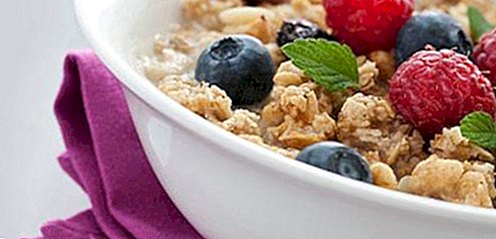With the right diet better through the menopause

Hot flashes, sleep disorders, depressive moods - for many women are the clear sign that their body produces fewer hormones. But that's not always why medications are needed. "Menopausal symptoms can be corrected by changing lifestyle, which requires a lot of exercise and a healthy diet," says Professor Ingrid Gerhard from Heidelberg.
Also her personally would have helped well. The specialist in gynecology, naturopathic medicine and environmental medicine recommends: "a lot of fruit, vegetables and whole grain cereals, little meat and animal products, better a vegetarian diet than mixed diet, vegetarians rarely have menopausal symptoms."
The problem could be raw food. If the estrogen level drops, the intestine becomes more sensitive, and many women no longer tolerate muesli and unhealthy foods as well. The alternative is cereal pudding and gently steamed or a few minutes blanched fruits and vegetables. Often, only some species such as cabbage cause problems, while "mild" varieties such as carrots and fennel can be eaten raw.
In any case, says Ingrid Gerhard: "The diet should be fortified with plant hormones." The best known of these "phytohormones" are the isoflavones, which are found in soybeans and soy products such as tofu, and the lignans, which are found mainly in flaxseed, but also in legumes, cereals, vegetables (eg broccoli, cauliflower, onions, carrots) and fruits (eg apples, berries, pears, pomegranates) are to be found. Whether complaints can always be alleviated by the consumption of phytohormones, is not scientifically proven. Admittedly, Asian women who eat a lot of soy throughout their lives barely suffer from menopause.
However, critics doubt that Western European women who change their diet in later years will benefit as well. However, soy isoflavones can not be harmed if they are taken up in natural form with food, as the Federal Institute for Risk Assessment (BfR) has determined. Women who are allergic to soy should, however, make better use of native sources of plant hormones: lentils, beans, peas and flaxseed, which also provide healthy fiber.
"It's always worth a try," says Irmela Erckenbrecht, nutrition expert and author of the "Menopause Cookbook" ("The Menopause Cookbook" by Irmela Erckenbrecht, Pala-Verlag, 14 euros). "Phytohormones can absorb the typical hormone fluctuations during the menopause and if they are eaten regularly as part of a balanced diet, they can positively influence the hormonal situation in the organism." Irmela Erckenbrecht's personal tip: core five to seven pomegranates, chop them and infuse them in 60% alcohol for four weeks, strain the brew and take 20 drops once or twice a day.
Low energy density prevents overweight.
In the menopause, however, not only the hormone production, but also the distribution of fat in the body changes. Fat is now stored mainly in the abdomen. In addition, the energy requirement decreases continuously as early as the middle of the 20th century and muscle mass decreases due to a lack of movement. A 50-year-old woman needs 400 calories less every day than a 25-year-old woman. Who does not adjust his diet to the lower basal metabolic rate, inevitably increases, overweight threatens. Anyone who wants to keep their weight should therefore change their diet at the latest at the beginning of menopause.
"Fewer calories should not cause women to consume less nutrients," says Dr. Andrea Flemmer, nutrition expert and biologist from Munich. "It is therefore important to choose foods that have a low energy density, so few calories per gram, and fill the stomach." As a rule of thumb, the more water and the less fat a food contains, the lower its energy density. Optimal vegetables, salad and fruit, best from organic farming, then the shells can be easily consumed.
Also lean meat and thin crispbread with a lot of lean ham as a sandwich are good. Hard cheese like Gouda, on the other hand, has a high energy density but contains a lot of calcium, which is important for bone health. Low-fat alternatives, including milk and other dairy products, are recommended. For those who find it difficult to change, Andrea Flemmer advises: "Eat as slowly as possible and chew a lot - do not puree soups, but let them stick together.
Healthy fats prevent diseases.
Eating more plant-derived, fiber-rich foods is also the most important recommendation to prevent diseases that can occur with age. "High blood pressure, cardiovascular disease and diabetes can be prevented, as science now knows, by a healthy diet and regular exercise, even the risk of cancer can be reduced," says Dr. med. Birgit-Christiane Zyriax, nutritionist at the University Medical Center Hamburg-Eppendorf. "After the menopause, the weight plays a major role, for example, in the development of breast, colon, kidney, pancreatic and uterine cancer." Above all, it recommends reducing the overall consumption of fat and eating as little saturated fat as possible (eg in meat, sausage, butter).
Omega-3 fatty acids that protect the heart and arteries are important. They're stuck in salmon and mackerel, olive, rapeseed and walnut oil. 65 percent of this contains linseed oil extracted from flaxseed? in addition to its valuable plant hormones. A teaspoon daily of salads, vegetables, potatoes or herbal quark dripped therefore double effect. "Every woman has to try out what she personally likes," says Birgit-Christiane Zyriax. "But the chance is good to do something about the diet itself."










